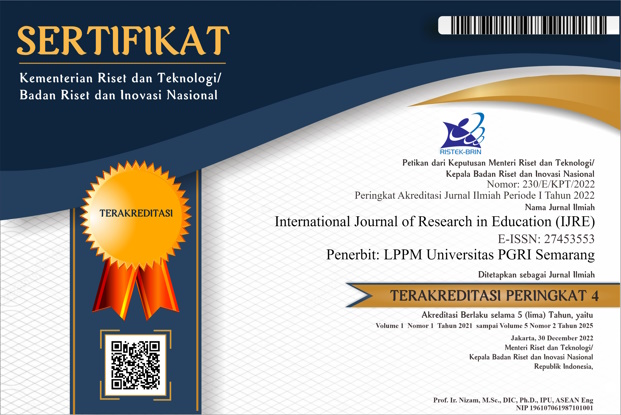Implementation Of Aristotic Character Education In Elementary School Learning Constructivism
DOI:
https://doi.org/10.26877/ijre.v5i1.703Keywords:
Character Education, Understanding Aristotle, Learning Constructivism, Primary schoolAbstract
The purpose of the study is to analyze the theoretical implementation between character education based on Aristotle's understanding and learning constructivism in the context of basic education. The research method uses qualitative descriptive analysis. The location of the research is SD Negeri 5 Cipondoh Makmur. Data collection uses observations, interviews, and documentation studies. Data collection was carried out for 2 sessions and validated using data triangulation and source triangulation. Data analysis uses interactive analysis through reduction, data display and inference. The results of the study show that character education based on Aristotle's understanding offers a rich and relevant approach in shaping children's character in elementary school. Through habituation of good behavior and hands-on experience, Aristotle's principles can be integrated into classroom learning to help children develop positive habits. In addition, this approach can be integrated with the principles of learning constructivism, which emphasizes the active role of learners in building their own knowledge through hands-on experience and reflection. The implication is to shape the character of children in elementary school through creating a learning environment that supports character formation, paying attention to the role of parents and the social environment.
References
Afif, A. (2023). Eudaimonisme: Kebajikan, Aktualisasi Potensi, dan Kebahagiaan. IRCISOD.
Bada, S. O., & Olusegun, S. (2015). Constructivism learning theory: A paradigm for teaching and learning. Journal of Research & Method in Education, 5(6), 66–70.
Chuang, S. (2021). The applications of constructivist learning theory and social learning theory on adult continuous development. Performance Improvement, 60(3), 6–14.
Creswell, J. W., & Creswell, J. D. (2017). Research design: Qualitative, quantitative, and mixed methods approaches. Sage publications.
Fadhilah, N. R., Safitri, D., & others. (2024). Implementasi Pembelajaran Ips Dalam Membangun Dan Membentuk Karakter Siswa. Sindoro: Cendikia Pendidikan, 3(10), 61–70.
Festiawan, R. (2020). Belajar dan pendekatan pembelajaran. Universitas Jenderal Soedirman, 11.
Hancock, D. R., Algozzine, B., & Lim, J. H. (2021). Doing case study research: A practical guide for beginning researchers.
Hermino, A., & Arifin, I. (2020). Contextual character education for students in the senior high school. European Journal of Educational Research, 9(3), 1009–1023.
Jaakkola, N., Karvinen, M., Hakio, K., Wolff, L.-A., Mattelmäki, T., & Friman, M. (2022). Becoming self-aware—how do self-awareness and transformative learning fit in the sustainability competency discourse? In Frontiers in Education (Vol. 7, p. 855583).
Jimenez, M. (2019). Empeiria and Good Habits in Aristotle’s Ethics. Journal of the History of Philosophy, 57(3), 363–389.
Juvova, A., Chudy, S., Neumeister, P., Plischke, J., & Kvintova, J. (2015). Reflection of constructivist theories in current educational practice. Universal Journal of Educational Research, 3(5), 345–349.
Kristjánsson, K. (2022). Reason and intuition in Aristotle’s moral psychology: why he was not a two-system dualist. Philosophical Explorations, 25(1), 42–57.
Kurdi, M. S. (2023). TANTANGAN DALAM IMPLEMENTASI PENDIDIKAN KARAKTER. Pendidikan Karakter, 102.
Lavy, S. (2020). A review of character strengths interventions in twenty-first-century schools: Their importance and how they can be fostered. Applied Research in Quality of Life, 15(2), 573–596.
Lickona, T. (2022). Character matters (Persoalan karakter): Bagaimana membantu anak mengembangkan penilaian yang baik, integritas, dan kebajikan penting lainnya. Bumi Aksara.
Matriano, E. A. (2020). Ensuring Student-Centered, Constructivist and Project-Based Experiential Learning Applying the Exploration, Research, Interaction and Creation (ERIC) Learning Model. International Online Journal of Education and Teaching, 7(1), 214–227.
Mulyasa, H. E. (2022). Manajemen pendidikan karakter. Bumi Aksara.
Nuñez Enriquez, O., & Oliver, K. L. (2021). ‘The collision of two worlds’: when a teacher-centered facilitator meets a student-centered pedagogy. Sport, Education and Society, 26(5), 459–470.
Nurindarwati, R., Hasyim, D., & others. (2022). EVALUATION MODEL OF CHARACTER EDUCATION PROGRAMS IN ISLAMIC RELIGIOUS EDUCATION AND MORAL EDUCATION LEARNING AT SMP NEGERI I SURAKARTA. Journal Research of Social Science, Economics & Management.
O’Connor, K. (2022). Constructivism, curriculum and the knowledge question: tensions and challenges for higher education. Studies in Higher Education, 47(2), 412–422.
Ramli, A., Putri, R., Trimadona, E., Abadi, A., Ramadani, Y., Saputra, A. M. A., … others. (2023). LANDASAN PENDIDIKAN: Teori Dan Konsep Dasar Landasan Pendidikan Era Industri 4.0 Dan Society 5.0 Di Indonesia. PT. Sonpedia Publishing Indonesia.
Rohmalimna, A., Yeau, O., & Sie, P. (2022). The role of parental parenting in the formation of the child’s self-concept. World Psychology, 1(2), 36–45.
Saleem, A., Kausar, H., & Deeba, F. (2021). Social constructivism: A new paradigm in teaching and learning environment. Perennial Journal of History, 2(2), 403–421.
Salmona, M., & Kaczynski, D. (2024). Qualitative data analysis strategies. In How to Conduct Qualitative Research in Finance (pp. 80–96). Edward Elgar Publishing.
Sanderse, W. (2020). Does Aristotle believe that habituation is only for children? Journal of Moral Education, 49(1), 98–110.
Sarita, P. (2017). Constructivism: A new paradigm in teaching and learning. International Journal of Academic Research and Development, 2(4), 183–186.
Snow, N. E. (2016). How habits make us virtuous. Developing the Virtues: Integrating Perspectives, 135–156.
Suparlan, S. (2019). Teori konstruktivisme dalam pembelajaran. Islamika, 1(2), 79–88.
Suwardani, N. P. (2020). “QUO VADIS” PENDIDIKAN KARAKTER: dalam Merajut Harapan Bangsa yang Bermartabat. Unhi Press.
Thomas-Smith, L. (2021). In Praise of Habit: The Necessity of Habit for Consistent Moral Practice. University of Colorado at Boulder.



